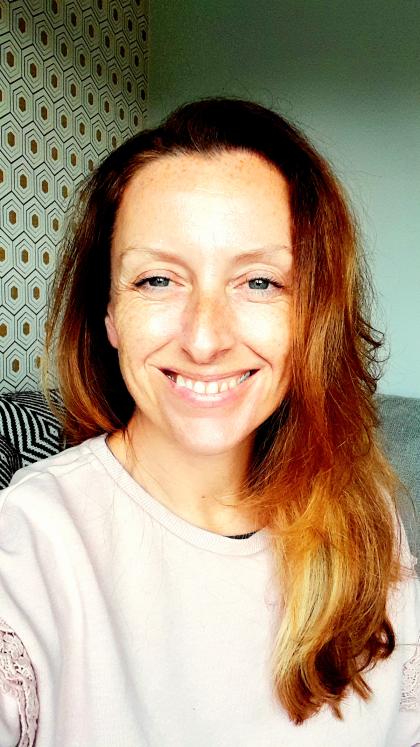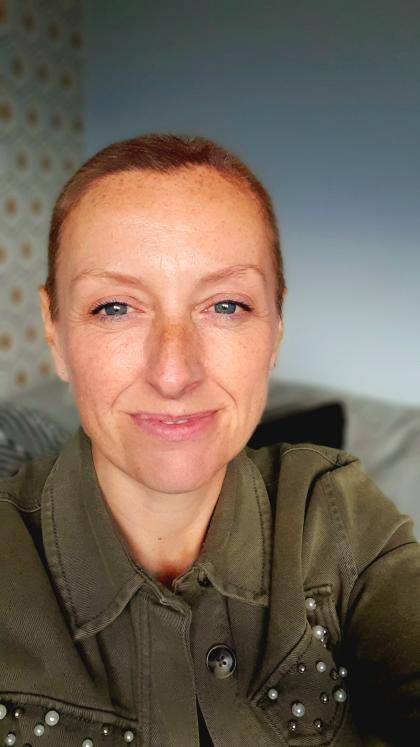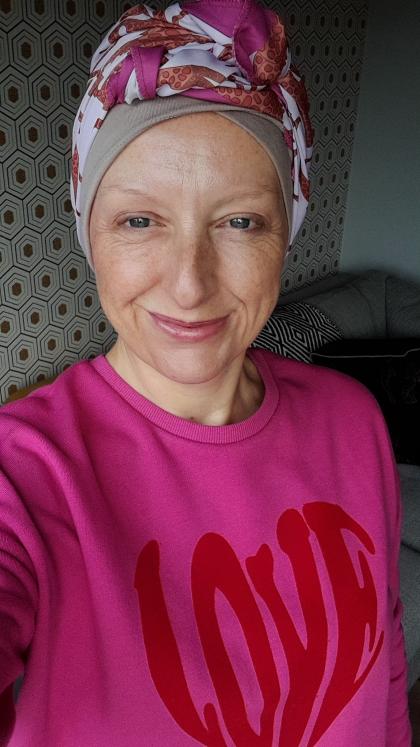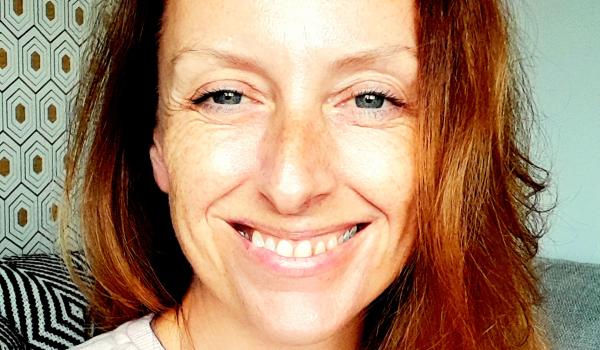When I was diagnosed in August 2022 with stage 3c high-grade serous ovarian cancer (HGSOC), it was a complete shock for me and my family. With no family history of ovarian or breast cancer, and being a healthy 49 year old taking on boot camp three times a week, it blindsided me.
It made sense to me that my symptoms could be due to the menopause.
I started to notice bloating and cramps back in December 2021 and was really concerned as my mum had been recently diagnosed with bowel cancer. I was prescribed medication via a telephone consultation with the nurse for IBS and told if my symptoms returned to come back. They didn’t, so I didn’t worry.

Six months later, I was back to the GP. Following a meal with friends, the bloating started again but this time was accompanied with pelvic pain – neither were easing. I put most of the symptoms I had down to the menopause and my age as I hadn’t had a period for a good few months and I was having night sweats, so it all seemed to make sense.
I didn’t know the symptoms of ovarian cancer before my diagnosis, so ovarian cancer never crossed my mind. I would never have disagreed with the explanations of IBS and menopause. We need national awareness media campaigns to get these symptoms in front of people, I believe it's the best chance we have of improving diagnosis while a routine screening tool is not available.
From cyst to cancer
I presented at my GP practice in July 22 and saw a locum nurse. She was excellent and arranged for bloods to be done (including a CA125 blood test) and said depending on the results, she would arrange for an ultrasound and refer me to gynaecology.
I went to the gynaecology appointment by myself, as I thought it was nothing to worry about so wouldn’t need anyone with me. During the transvaginal ultrasound, the consultant confirmed there was a complicated looking cyst. Something in me knew then it was cancer.
I was, of course, extremely upset and with no one to talk to, I didn’t know what to do. Driving myself home that night was a long and lonely journey.
As I waited for the official diagnosis, I only told my husband and sister about the possibility it could be cancer. I didn’t want to worry anyone else without confirmation. Five weeks later I had the CT scan which confirmed the diagnosis. When the call came I just screamed, then cried.
Chemotherapy, bootcamp and flying to get my surgery
Three months after that initial appointment with the locum nurse, I started chemotherapy. I felt excited to get started as I saw it as a means to an end, but knowing I would lose my hair felt like a blow.
My mantra was ‘my life or my hair’ and this attitude helped me push through the fatigue and challenges I would face with having chemo once every three weeks. I even managed to go to bootcamp in the days after my sessions – much to my husband’s disapproval!

I had three sessions of chemotherapy and a midway scan which confirmed the cancer was reducing and so I was put on the waiting list for surgery. However, where I live in West Scotland, there were issues with the waiting lists and so my consultant referred me to a surgeon in London to discuss having the surgery privately.
I really wanted the next stage to be over with. I therefore decided to go privately and flew to London for my surgery. What would my choices have been had I not? Had I waited on the list, I would only just have had my surgery some three months later and after completing chemotherapy.
This is an issue that affects the overall landscape of care that is being provided in Scotland, particularly in the West, and it means that women are not getting the life-saving surgery they require when they need it. This needs to change.
Preparing for surgery, I was preparing for the worst. Leaving home, I looked at my things as if it would be the last time I saw them, cuddling my cat Eddi goodbye and making sure my husband knew where our insurance policies were and passwords to online banking. My anxiety was through the roof and it was horrible.
The team in London were incredibly reassuring though, and thankfully my husband could stay with me so was there on the morning of my surgery. As I walked down the corridor dressed in my gown and stockings, accompanied by the team, I felt I was walking to the electric chair.
But what felt like moments after lying down in the room, I was awake in recovery, smelling my husband’s aftershave from afar. I was so relieved.
Making support more accessible
Many women don’t know that there are organisations like Target Ovarian Cancer that will provide support, information and advice. I came across the charity on google, on my own, and did the leg work myself. No one signposted me to any charities for this.
I know that not everyone wants to be in touch with organisations, because facing a diagnosis of ovarian cancer is incredibly scary, but without support it can be even scarier.
Women need to have access to support and a choice to take it or leave it and I think it would be great if there was an automated referral process from the GP or secondary care team. It can be hard to find your voice and ask for support, I was well enough to find it but not everyone is. I don’t know how they'd cope doing this on top of their symptoms and chemotherapy.

Where I am now
Following surgery I had further chemotherapy and my last scan in February 2023 shows no evidence of disease.
I still need to go onto maintenance therapy and could be on this for the next three years. Everyone around me is ecstatic but I really don’t feel that excited. While folk think I’m done and I’m OK, I know I’m very far from that.
I still have to be watched and monitored and have weekly bloods and routine scans done. It’s not over, yet a lot of people think it is.
I can never stop thinking about it… it’s always going to be there, sitting on my shoulder chipping away at me. I find myself not wanting to plan things too far in advance just in case and then the other me says, you can’t keep doing this. I need to live my life to the fullest.
I want to share my story to help raise awareness about the symptoms but also to make people realise that it doesn't end when chemo ends, but also to raise awareness of the issues in accessing surgery in Scotland.
It's scary to think had we not used our life savings to fund the surgery, that I could still be waiting for the treatment knowing the cancer could be advancing.
Scotland don’t do this type of surgery privately at all, so going to England incurred additional costs. No amount of money can be put on saving your life though.
If you’ve been affected by this story and would like to speak to a specialist nurse, you can call our dedicated support line on 020 7923 5475 or contact us: [email protected]. We're open from 9am until 5pm, Monday to Friday.
If reading this story has helped you, join the Ovarian Cancer Community to connect with more people affected by ovarian cancer: www.targetovariancancer.org.uk/onlinecommunity



